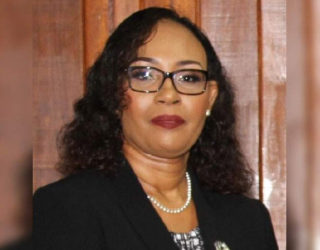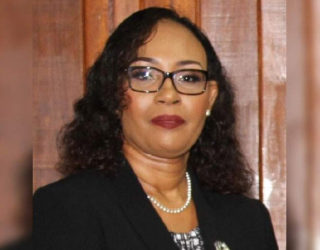(Trinidad Express) The 53 criminal matters that former Chief Magistrate Marcia Ayers-Caesar left undone so she could accept an appointment as a High Court judge, must all be restarted.
And priority will be given to the cases given the hardship already experienced by the increased, accused on bail, victims, witnesses and other stakeholders within the system.
This was the decision taken following a meeting convened by Chief Justice Ivor Archine and comprising Director of Public Prosecutions Roger Gaspard, the Law Association, Criminal Bar, acting Chief Magistrate, senior Magistrates and the Registrar of the Supreme Court.
The meeting, according to a statement from the Judiciary, was held to determine a way forward for the part-heard matters left unresolved by Ayers-Ceasar
Marcia Ayers-Caesar was appointed, along with two other individuals, as a High Court judge by the Judicial and Legal Service Commission (JLSC) on April 12, 2017.

Marcia Ayers-Caesar
The appointment was initially criticised by Opposition Senator Gerald Ramdeen who questioned the process of appointing judges and called for more transparency.
Chief Justice Ivor Archie immediately defended the appointments, claiming that “anyone who is appointed has been through one of the most rigorous selection processes you can find anywhere in the region or Commonwealth.” He went on to detail the criteria for appointment of judges.
Meanwhile, the judiciary’s Court Protocol and Information Manager Alicia Carter-Fisher, gave the assurance that the magistrates’ court would not be adversely affected. She added that the there were no ongoing preliminary inquiries before Ayers-Caesar before her elevation but “she had before her paper committals which could be continued by another magistrate.”
On April 27 Ayers-Caesar resigned as a High Court judge, just two weeks after she was sworn in. The resignation was triggered by a fracas involving prisoners at the Port of Spain Magistrate’s Court when their matters were adjourned until May and revelations that she had left 54 part-heard matters in the magistrates’ court, all of which would have had to be scrapped and re-started.
Apart from the position of former chief justice Michael de la Bastide, Ayers-Caesar’s appointment, subsequent resignation and proposed re-appointment, prompted a barrage of criticisms from members of the legal fraternity including the Law Association and Senior Counsels Israel Khan, Martin Daly and Pamela Elder as well former High Court judge Herbert Volney. Most of the criticisms were directed against the CJ and the JLSC which he heads.
On May 2 the Express reported that Ayers-Caesar, never resigned from the magistracy before her appointment as a Supreme Court judge by the JLSC and her swearing-in by President Anthony Carmona.
The Ayers-Caesar matter remains unresolved.
Meanwhile, consensus was reached at the Wednesday meeting where it was agreed that the 53 matters he restarted “do novo” (from the beginning).
The acting Chief Magistrate will preside over indictable matters and all summary matters will be handled by an assigned magistrate in the St George West Magistrates’ Court. All other eight court matters which have not been started will be managed by the acting Deputy Chief Magistrate.

